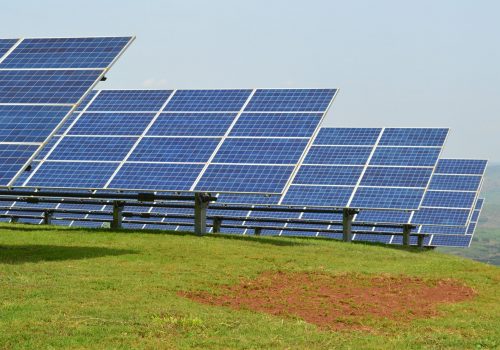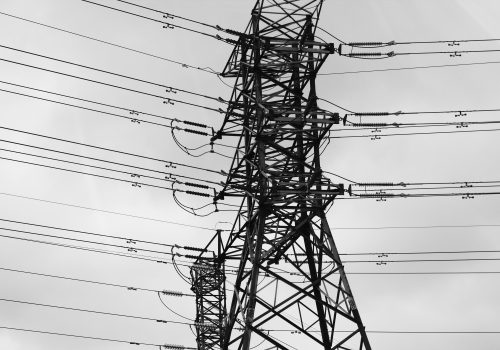Event Recap
The Africa Center was pleased to host UNCCD Executive Secretary Ibrahim Thiaw for a conversation on Thursday, October 27th at 1pm ET. Thiaw was joined by Africa Center senior fellow Aubrey Hruby and GeoEconomics Center senior fellow Nicole Goldin. The conversation was moderated by Amb. Rama Yade, the Senior Director of the Africa Center. With the opening of COP27 in Sharm El-Sheikh, Egypt only a few days away, the conversation focused on issues of climate finance, youth employment opportunities in agriculture, the role of women in climate change adaptation, and necessary steps for achievable outcomes at the conference.
Senior fellow Aubrey Hruby opened the conversation by asking Secretary Thiaw on his expectations for COP27. Discussing the recent COP15 of the UNCCD, Secretary Thiaw mentioned their efforts on issues concerning land, water, drought, and climate because “these issues are absolutely interlinked.” Thiaw discussed the need to imagine the impact of climate challenges on the individual farmer; according to him, “there’s not a COP that will be meaningful unless we have that farmer in mind.” This demonstrates his hopes for the upcoming conference.
Next, Secretary Thiaw discussed the role of financing in climate change adaptation. “We need to move towards more sustainable production and consumption” to shift the supply chain, he highlighted. In order to do so, “massive financing” is needed. Additionally, Thiaw outlined the impacts of the $100 billion pledge made by wealthy countries thirteen years ago in Copenhagen to help lower-income countries adapt to climate change. According to him, this pledge has created “major division between the North and the South.” “We need to treat this together,” he said. Further, Thiaw noted that this “energy transition will require a lot of funding,” and fulfilling the Copenhagen pledge is only the first step to meeting this need.
Amb. Yade and Secretary Thiaw then discussed climate refugees in the Sahel and the impact of deteriorating climate change on these refugees. Thiaw noted the controversy surrounding the term “climate refugee,” stating that it is “not accepted by everybody.” However, he notes that for many people “their land is so degraded that they cannot generate income there.” “Forced migration exists,” he noted. The only solution, according to Thiaw, is to help these forced migrants “restore the land” and “develop their own activities.”
Jihadist extremism continues to be a major issue in the Sahel, and Thiaw outlined that “most of the people they use are from the region.” To counter this, it’s important that young people “are given hope and opportunities to thrive in their own region,” he said. He discussed the potential of the Great Green Wall initiative to provide these employment opportunities to young people.
GeoEconomics Center senior fellow Nicole Goldin then joined the conversation to ask Secretary Thiaw about the role of women in climate change adaptation and the effects of increasing climate issues on women in agriculture. Thiaw noted that “45% of small-holder farmers are women” and lack access to land. “This is unfair,” he said. Thiaw urged for a greater recognition of women in the space of climate change adaptation: “Not only should women be at the table, they should also grab the agenda.” Because women comprise a significant proportion of those affected by climate change, he believes organizations such as UN Women need to ensure that they are at the heart of all conversations.
The conversation concluded by discussing the importance of public finance to achieve climate objectives. Thiaw stated that “the majority comes from private finance, but we need public investment to mobilize financing.” Thiaw had hope that this was possible, however, and called on nations to put forth these priorities at the upcoming COP27.
Caitlin Mittrick is a graduate student at the George Washington University Elliott School of International Affairs and a Young Global Professional at the Atlantic Council Africa Center.
Original Event Text
The Africa Center is thrilled to host Ibrahim Thiaw, Executive Secretary of the United Nations Convention to Combat Desertification (UNCCD), for a conversation on the eve of the 27th United Nations Climate Change Conference of the Parties taking place in Egypt in a few weeks.
The degradation of land is a major issue as the world grapples with the impact of climate change. Degraded land not only compounds the effects of climate change with increased chances of drought, floods, and wildfires, but also contributes to the loss of biodiversity, increased poverty and hunger, increased pollution, the weakening of social cohesion, and the spread of disease.
With African nations already being impacted by climate change, there is an urgency to identify and leverage innovative financing instruments to address climate vulnerabilities. Join us as we look at how land and a changing climate are at the center of modern geoeconomic considerations and sustainable development initiatives in Africa.
This event is the latest to take place in the Africa Center’s Inclusive Climate Finance programing, launched in April 2022 by Nigerian Vice President Yemi Osinbajo.
Join the Africa Center online for this event on Thursday, October 27, 2022, at 1:00p.m. ET. If you have any questions about this event, contact the Africa Center’s Program Assistant, Alexander Tripp, at atripp@atlanticcouncil.org.
Featuring
Ibrahim Thiaw
Executive Secretary
United Nations Convention to Combat Desertification (UNCCD)
Panelists
Aubrey Hruby
Senior Fellow
Africa Center, Atlantic Council
Nicole Goldin
Senior Fellow, GeoEconomics Center, Atlantic Council
Global Head, Inclusive Economic Growth at Abt Associates
Moderator
Amb. Rama Yade
Senior Director
Africa Center, Atlantic Council

The Africa Center works to promote dynamic geopolitical partnerships with African states and to redirect US and European policy priorities toward strengthening security and bolstering economic growth and prosperity on the continent.


